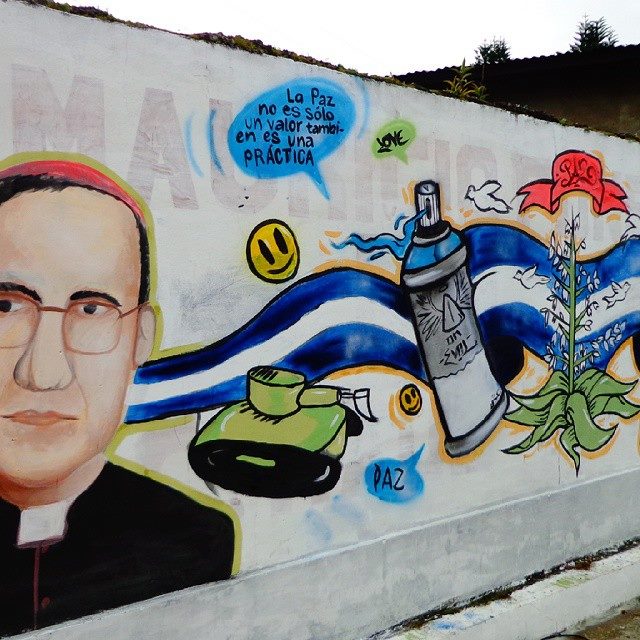
Mural in El Salvador El Salvador / AFSC
A look at some of the daily struggles faced by young peacemakers in one of Latin America's most violent countries.
I began working as an intern with AFSC in El Salvador at the end of 2015, the year that our country was ranked the most violent in Latin America. That year, the country witnessed a 70 percent increase in violent deaths—one of the most deadly since the height of El Salvador’s civil war in the early ’80s. According to a recent report from the Research Network of the Salvadorean Central Bank, the total cost of violence in our country is close to 16 percent of our gross domestic product, the highest level in Central America.
The situation continued deteriorating until, at the end of March 2016, the three major gangs announced a ceasefire and an end to homicides caused by their members. Meanwhile, the government announced extraordinary measures to ramp up its response to gang violence, including recruiting the Armed Forces to support their efforts. Since April, the homicide rate has declined 50 percent compared to the first quarter of this year.
The government claimed this decrease was an accomplishment of its new security strategy, while gangs attributed it to their agreement to cease homicides. It’s unclear what really caused the decrease, although it is clear that the dynamics of violence have changed into a more complex situation.
In urban areas, we often find that organized crime, police and military repression, and violence in general co-exist in the same space.
These are the circumstances that most of the young people we work with face on a daily basis. In El Salvador and other parts of Central America, AFSC supports local peace networks (LPNs) that bring together young people to peacefully resolve community disputes, exchange ideas, and enhance their leadership skills, as well as promote nonviolent community activities. Their ultimate objective is to encourage young leaders to challenge the popular perception that violence and discrimination are a normal part of their everyday lives.
I’ve interviewed some of the young members who are part of these networks in the municipalities of Mejicanos and Cuscatancingo about the challenges they face in their everyday lives. Here’s a glimpse of what life looks like for many of the young people we work with.
Mejicanos

In April 2016, Mejicanos was the fourth most dangerous municipality of El Salvador. The youth of the LPN live in areas disputed by gangs and suffer the consequences of heavy police interventions. In some cases, the dismantling of a gang by police forces has allowed the rival gang to take advantage of the situation and control the territory. As a result, youth are sometimes left in an even more vulnerable situation.
In my interviews, I found that some young people feel safer in their schools than in their houses and therefore try to spend the least possible time at home. To further complicate the matter, many live in constant fear of being confused with members of criminal groups, of having their rights violated by the police, and of being victims in the crossfire.
However, the situation can be completely different in other areas of the municipality. Other members actually feel safer with a police presence near their homes. But they feel vulnerable on public transport and in their schools, since robberies are frequent on buses and violence isn’t uncommon among classmates. These incidents are so frequent that I was not surprised when some members were robbed on public transportation the very day that I interviewed them.
In Mejicanos, young people who are threatened often drop out of school. During the 2015 school year, 39,000 students dropped out of public education centers in El Salvador and, according to the National Education Council, more than one-quarter of those students dropped out because of the effects of violence in their community.
We’re encouraged that all of the young members of the LPNs that AFSC supports remain enrolled in school. Still, some of these students struggle on a daily basis to continue their studies because their schools are often in areas controlled by gangs who are rivals of ones that dominate the neighborhoods they live in. For them, staying in school is a constant challenge when it can be dangerous just to commute there every day.
Cuscatancingo
 In Cuscatancingo—just a few miles east of Mejicanos—young members of the LPN find themselves the target of police, even though they’re not involved in gang activity. Police officers repeatedly come to their homes looking for them and carry out long questioning sessions to verify that they’re not part of a gang.
In Cuscatancingo—just a few miles east of Mejicanos—young members of the LPN find themselves the target of police, even though they’re not involved in gang activity. Police officers repeatedly come to their homes looking for them and carry out long questioning sessions to verify that they’re not part of a gang.
This practice can stigmatize youth personally and in the eyes of community members. As a member of the LPN told me, ``It does not matter how focused you are in your own business or how hard you are studying. If people see police officers in your home, everyone will think you are up to something wrong, and they will start to look at you in a different way.”
Stigmatization of young people is widespread in Cuscatancingo and can hamper their opportunities for success. Young people who are not in school are often associated with criminals. Youth are even discriminated against if they didn’t graduate from what community members perceive is a “good school,” which is often not possible when such schools are located in rival gang areas or are prohibitively expensive.
Peace network members spoke to me about their struggles in finding jobs or applying to college. As a result, studying becomes less attractive for them, given the limited benefits many of them get from it.
Military and police repression have also made it difficult for LPN members to participate regularly in our network meetings. Parents see the heavy deployment of police forces and understandably do not want their children to be mistaken for gang members. They would rather make them stay home to avoid any risks. And word has spread that we may soon see a heavier police presence in the area.
Faced with these circumstances, AFSC has worked to improve access to LPN meetings, including holding meetings outside of areas of conflict to encourage young people to continue taking part in local peace networks. We believe that there is a value in the skills they build, the experiences they gain, and the connections they make with others who are also committed to peace and justice.
We have confidence in their leadership and advocacy abilities. Even in these conditions, it is critical that we do not stop helping young people promote community peace building as they keep up their work to eradicate the culture of violence inside their communities.